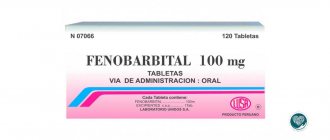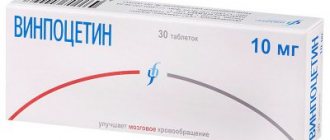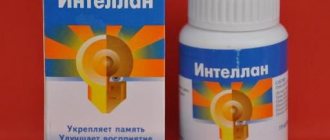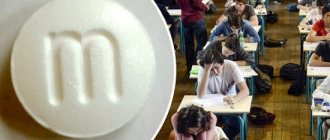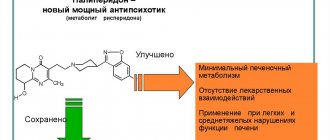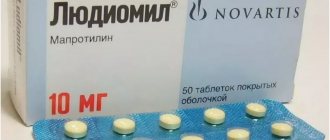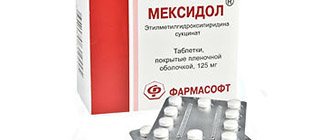pharmachologic effect
Glycine is a substance that is a non-essential amino acid. Under its influence, metabolic processes in brain tissue become more active and an antioxidant effect is provided. Glycine also regulates the activity of glutamate receptors. As a result, a person’s conflict, aggressiveness, and psycho-emotional stress decrease. The patient's mood improves, the drug helps overcome symptoms of insomnia , symptoms of vegetative-vascular disorders, disorders in people who have recently suffered a traumatic brain injury or ischemic stroke . In addition, glycine reduces the degree of toxic effects of ethanol on the central nervous system.
Glycine – placebo or effective?
Glycine is one of the most popular and affordable drugs used for all occasions. It is taken both to improve memory in children and to treat hangovers in adults. How does glycine affect the human body and how effective is it?
Anatomy of a drug
Glycine is the simplest amino acid without aromatic chemical bonds. It has a sweetish taste, is produced by the body itself and is part of many organic compounds and proteins. In particular, the amino acid is involved in the Krebs cycle - the process of glucose oxidation and saturation of cells with oxygen. Glycine accelerates this process and makes tissue respiration possible even in conditions of oxygen starvation of the body.
As a rule, the body rarely experiences a lack of glycine. During heavy exercise, when cells require more oxygen and energy, the amino acid content increases and the body's physical capabilities increase. A lack of amino acids will provoke metabolic disorders and affect a person’s well-being.
Glycine (aminoacetic acid, aminoethanoic acid) – C2H5NO2
The brain needs glycine most of all, since the amino acid is also a neurotransmitter - it is involved in the transmission of electrochemical impulses between neurons. At the same time, glycine slows down signal transmission. It suppresses the production of glutamic acid, whose task is exactly the opposite. As a result, the muscles relax and nervous tension is relieved.
By comparison, when the brain experiences an excess of glutamic acid, muscle cramps occur and nerves become taut like guitar strings. Psychologically, this leads to dissipation of attention, hyperactivity and increased aggression.
In pharmacies, the amino acid is sold in the form of tablets that must be dissolved under the tongue. Pharmacists claim that the medicine has a calming effect, reduces the side effects of a hangover, and also improves intellectual abilities.
How effective is the medicine glycine?
The body's glycine content is strictly regulated. However, in moments of stress, when the content of glutamic acid goes off scale, doctors recommend helping the body calm down.
In the case of children, the amino acid makes the child diligent, normalizes sleep and, as a result, allows him to be more attentive in his studies. When it comes to adults, glycine is used in the treatment of alcohol and drug addiction.
Laboratory experiments have revealed that the drug has a beneficial effect on cerebral vessels, relieves restless legs syndrome and even helps with acute myocardial ischemia.
True, everyday life is far from laboratory conditions and in fact the effectiveness of the drug has not been proven.
The fact is that the central nervous system is covered with a protective layer and does not accept beneficial amino acids from the outside.
As for the cells of the body, in order for glycine not to be washed away in the blood and reach the tissues, it must have a very high concentration. This is where the problem arises. Contrary to popular belief, it is still possible to be poisoned by large amounts of glycine.
An overdose of the drug will manifest itself in diarrhea, abdominal pain, low blood pressure, dizziness and increased body temperature. In addition, there may be complications associated with the liver and kidneys. An allergic reaction may also occur.
Should I take glycine?
Despite the unproven effects and criticism from a number of researchers, doctors recommend using glycine.
This medicine does not work as a strong tranquilizer or antidepressant. By the way, if this were so, it would not be sold freely.
However, as part of other medications, as an aid to the main drug, the use of glycine is quite justified.
Glycine is a substance with a history, numerous positive reviews and a low price. It is very effective as a placebo drug. If you sincerely believe that it will help you calm down and affect your intellectual abilities, then it will be so.
Doctor-hygienist
Gapanovich Valentina
Valeologist
Dmitrieva Lyudmila
Indications for use Glycine Bio
There are the following indications for the use of Glycine Bio:
- stressful condition , which provokes a state of psycho-emotional tension;
- deviant behavior in adolescents and children;
- deterioration of mental performance;
- diseases of the nervous system of a functional and organic nature, in which there is a high level of excitability and emotional stress;
- insomnia, other sleep disorders associated with neuroses, vegetative dystonia, various forms of encephalopathy (including those associated with alcohol abuse);
- cerebral infarction.
The drug is used in narcology for treatment during remission in encephalopathy and NS lesions.
Best before date
24 months
Vitamins with similar effects
- Blue blackberry, leaves-C (Raw materials for the production of dietary supplements)
- Ginseng and Shiitake (Oral Solution)
- ImmuniVit (Capsule)
- Oculist blueberry (Oral tablets)
- Goal T (Solution for injection)
- Elfasept Phyto-Lor (Pastilles)
- VITABS Bio with bifidobacteria (Capsule)
- Vitakras (Capsule)
The description of vitamin Glycine-BIO Pharmaplant is intended for informational purposes only. Before starting to use any drug, it is recommended to consult a doctor and read the instructions for use. For more complete information, please refer to the manufacturer's instructions. Do not self-medicate; EUROLAB is not responsible for the consequences caused by the use of information posted on the portal. Any information on the project does not replace consultation with a specialist and cannot be a guarantee of the positive effect of the drug you use. The opinions of EUROLAB portal users may not coincide with the opinions of the site Administration.
Are you interested in vitamin Glycine-BIO Pharmaplant? Do you want to know more detailed information or do you need a doctor's examination? Or do you need an inspection? You can make an appointment with a doctor - the Euro lab is always at your service! The best doctors will examine you, advise you, provide the necessary assistance and make a diagnosis. You can also call a doctor at home . Euro lab clinic is open for you around the clock.
Attention! The information presented in the vitamins and dietary supplements section is intended for informational purposes and should not be a basis for self-medication. Some of the drugs have a number of contraindications. Patients need to consult a specialist!
If you are interested in any other vitamins, vitamin-mineral complexes or dietary supplements, their descriptions and instructions for use, their analogues, information about the composition and form of release, indications for use and side effects, methods of use, dosages and contraindications, notes about the prescription of the drug for children, newborns and pregnant women, price and consumer reviews, or you have any other questions and suggestions - write to us, we will definitely try to help you.
Instructions for use Glycine Bio (Method and dosage)
Instructions for use provide for transbuccal or sublingual use of tablets. In stressful situations, memory deterioration, decreased performance, as well as deviant behavior , adult patients and children are advised to take 100 mg of the drug 2-3 times a day. Treatment can last up to 1 month.
If the patient is diagnosed with lesions of the nervous system , in which symptoms of excitability and emotional arousal are noted, the drug is prescribed to children under three years of age in a dose of 50 mg Glycine Bio 2-3 times a day for 1-2 weeks, children after three years of age should receive 100 mg 2-3 times a day. The course can last from 1 to 4 weeks.
If the patient has sleep disorders , then, depending on the person’s age, he needs to take 50-100 mg of the drug before going to bed.
Patients with cerebral infarction need to take 1 g of the drug in the first 3-6 hours after the onset of stroke . In the next 1-5 days you should take 1 g of the product per day, then for another 30 days. 100-200 mg three times a day.
In drug treatment practice, 100 mg is prescribed 2-3 times a day, treatment lasts from 2 to 4 weeks.
Glycine-bio pharmaplant 100 mg 150 pcs. sublingual tablets
pharmachologic effect
Metabolic agent.
Composition and release form Glycine-bio pharmaplant 100 mg 150 pcs. sublingual tablets
Tablets - 1 tablet:
- active substance: glycine 0.05 g and 0.1 g;
- excipients: povidone (kollidon 25), microcrystalline cellulose, magnesium stearate.
10, 50 tablets per blister pack.
10, 30, 50 or 100 tablets in a polymer container for medicines or a glass bottle. One container (bottle) or 1, 3, 5 or 10 blister packs along with instructions for use are placed in a cardboard pack.
5, 10 or 20 containers (bottles) or 20, 30, 50 or 100 blister packs together with the corresponding number of instructions for use are placed in a cardboard box (for hospitals).
Description of the dosage form
White tablets with a score on one side and a bevel on both sides. Marbling is allowed.
Directions for use and doses
Sublingual or buccal 100 mg (in tablets or in powder form after crushing the tablets).
For practically healthy children, adolescents and adults with psycho-emotional stress, decreased memory, attention, mental performance, mental retardation, and deviant forms of behavior, glycine is prescribed 100 mg 2-3 times a day for 14-30 days.
For functional and organic lesions of the nervous system, accompanied by increased excitability, emotional lability and sleep disturbances, children under 3 years of age are prescribed 50 mg 2-3 times a day for 7-14 days, then 50 mg 1 time a day for 7-10 days. Daily dose - 100-150 mg, course dose - 2-2.6 g.
Children over 3 years of age and adults are prescribed 100 mg 2-3 times a day, the course of treatment is 7-14 days, it can be increased to 30 days, if necessary, the course is repeated after 30 days.
For sleep disorders, 50-100 mg is prescribed 20 minutes before bedtime or immediately before bedtime (depending on age).
In narcology - 100 mg 2-3 times a day for 14-30 days. If necessary, courses are repeated 4-6 times a year.
Pharmacodynamics
A non-essential amino acid, a central inhibitory neurotransmitter. Improves metabolic processes in brain tissue, has an antidepressant and sedative effect. It has GABAergic, alpha 1-adrenergic blocking, antioxidant and antitoxic effects; regulates the activity of glutamate (NMDA) receptors, thereby reducing psycho-emotional stress, aggressiveness and conflict; improves social adaptation and mood; makes it easier to fall asleep and normalizes sleep; increases mental performance; reduces the severity of vegetative-vascular disorders (including during menopause), reduces the toxic effect of ethanol on the central nervous system. Effective as an adjuvant for epileptic seizures.
Pharmacokinetics
Easily penetrates into most biological fluids and body tissues, including the brain, and does not accumulate. It is quickly destroyed in the liver by glycine oxidase to water and carbon dioxide.
Indications for use Glycine-bio pharmaplant 100 mg 150 pcs. sublingual tablets
Stressful conditions (including psycho-emotional stress), decreased mental performance, deviant forms of behavior in children and adolescents, various functional and organic diseases of the nervous system, accompanied by increased excitability, emotional instability, decreased mental performance and sleep disturbances: neuroses, neurosis-like conditions, consequences of neuroinfections and traumatic brain injuries, perinatal and other forms of encephalopathies (including those of alcoholic origin). In narcology - as a drug that increases mental performance and reduces psycho-emotional stress during the period of remission in cases of encephalopathy, organic lesions of the central and peripheral nervous system.
Contraindications
Hypersensitivity.
With caution: arterial hypotension.
Application of Glycine-bio pharmaplant 100 mg 150 pcs. sublingual tablets during pregnancy and breastfeeding
Maybe.
special instructions
In patients with a tendency to arterial hypotension, Glycine-Bio Pharmaplant® is taken in smaller doses and under the control of blood pressure; if it decreases below the usual level, the intake is stopped.
Impact on the ability to drive vehicles and operate machinery
When taking the drug Glycine-Bio Pharmaplant®, you should be careful when driving vehicles and engaging in other potentially hazardous activities that require increased concentration and speed of psychomotor reactions, taking into account the side effect profile.
Side effects Glycine-bio pharmaplant 100 mg 150 pcs. sublingual tablets
Allergic reactions.
Drug interactions
Reduces the severity of side effects of antipsychotic drugs (neuroleptics), anxiolytics, antidepressants, sleeping pills and anticonvulsants.
Analogs
Level 4 ATX code matches:
Bravinton
Acefen
Carnicetine
Pyracesin
Nooclerin
Semax
Piracetam
Olatropil
Fezam
Vinpocetine
Cerebrocurin
Cavinton Forte
Calcium hopantenate
Glutamic acid
Cephabol
Olanzapine
Cerebrolysate
Pramistar
Sidnocarb
Vinpotropil
There are a number of analogues of this drug. These are the drugs Glycine Ozone , Glycised , Glycine Forte , Glycine Biotics and other drugs whose active ingredient is glycine. But only a doctor should choose the most suitable drug in each case.
